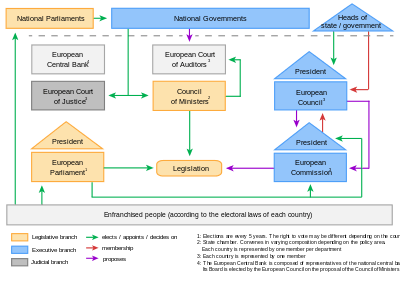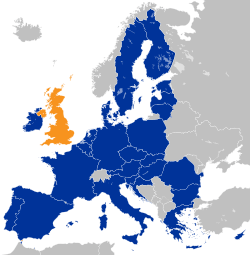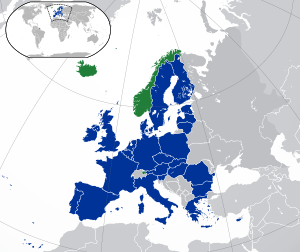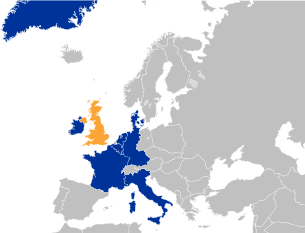Post-Brexit United Kingdom relations with the European Union
As of February 2020, the United Kingdom's post-Brexit relationship with the remaining European Union members remains to be negotiated. Following the UK's secession from the EU on 31 January 2020,[lower-alpha 1] the UK continues to conform to EU regulations and to participate in the EU Customs Union during a transition period that UK legislation states must end by 31 December 2020. The UK government's position is that the transition period will not be extended, notwithstanding the EU's insistence that the current timetable is unrealistic. It is possible that a trade agreement will not be completed and negotiations terminated, resulting in a no-deal Brexit.[1]
 | |
EU |
United Kingdom |
|---|---|
| Diplomatic mission | |
| European Union Delegation, London | United Kingdom Mission, Brussels |
| Envoy | |
| Ambassador João Vale de Almeida | Ambassador Tim Barrow |

| Part of a series of articles on | ||||||||||||||||||||
| British membership of the European Union | ||||||||||||||||||||
|---|---|---|---|---|---|---|---|---|---|---|---|---|---|---|---|---|---|---|---|---|
 | ||||||||||||||||||||
|
Treaty amendments
|
||||||||||||||||||||
|
||||||||||||||||||||
|
Officials and bodies |
||||||||||||||||||||
|
Issues and events |
||||||||||||||||||||
|
|
||||||||||||||||||||
|
| ||||||||||||||||||||
| This article is part of a series on the |
| Politics of the United Kingdom |
|---|
.svg.png) |
UK General Elections
European Parliament Elections (1979–2019)
Scottish Parliament Elections
Northern Ireland Assembly Elections
Welsh Parliament (Senedd Cymru) Elections
|
|
|
|
|
|
|
 |
|---|
| This article is part of a series on the politics and government of the European Union |
|
Member States (27)  European Union since 31 January 2020 |
Treaties of Accession
Treaties of Succession
Other Treaties
Abandoned treaties and agreements
|
|
|
Schengen Area Member States
Schengen Area since 2015 |
|
EEA Members
 European Economic Area |
|
Former European Bodies
|
Elections in EU Member States
|
|
Policies and Issues |
|
Other
Non-Schengen Area States
|
|
Foreign relations of EU Member States
|
|
|
History
The Brexit transition period began on 1 February 2020, and is due to end on 31 December 2020. This allows for a period of time to negotiate a bilateral free trade agreement between the UK and the EU.
Trade
The UK has decided to withdraw from the single market, the customs union, and all EU international agreements.[2]
Those definitive changes could create difficulties which might be under-estimated, according to Michel Barnier:[3]
- re-introduction of customs formalities, as was the case before UK membership, for every product imported and exported to and from the EU and the UK
- end of financial passporting rights for the UK services sector
- UK product certification will no longer be recognized within the EU
- imposition of non-tariff barriers to trade, such as the possibility of lengthy delays at the border, import quotas and immigration restrictions resulting from the loss of EU citizenship for UK workers
Post-Brexit negotiations will try to create an ambitious pact between the UK and the EU to avoid disruption as much as possible, according to Michel Barnier.[4]
UK membership of the European Economic Area
The UK could have sought to continue to be a member of the European Economic Area, perhaps as a member of EFTA. In January 2017, Theresa May, the British Prime Minister, announced a 12-point plan of negotiating objectives and said that the UK government would not seek continued membership in the single market.[5][6]
WTO option
The 'no-deal' WTO option would involve the United Kingdom ending the transition period without any Free Trade Agreement and relying on the most favoured nation trading rules set by the World Trade Organization.[7] The Confederation of British Industry said such a plan would be a "sledgehammer for our economy",[8][9][10] and the National Farmer's Union was also highly critical.[11] Positive forecasting for the effects of a WTO Brexit for the UK cite other countries' existing WTO trade with the EU and the benefits of repossessing full fishing rights for a maritime island nation.[12][13][14]
People
Northern Ireland
One aspect of the final withdrawal agreement is the anomalous status of Northern Ireland.[18] The Northern Ireland Protocol that is part of the agreement provides (inter alia)
- Northern Ireland remains legally in the UK Customs Territory, and is part of any future UK trade deals. This results in a de jure customs border on the island of Ireland, between Northern Ireland and the Republic of Ireland.[19][20]
- Great Britain is no longer in a customs union with the European Union. Northern Ireland is also no longer legally in the EU Customs Union, but remains an entry point into it, creating a de facto customs border down the Irish Sea.[21][19][20]
- Level Playing Field provisions applying to Great Britain have been moved to the non-binding Political Declaration, although they are still present for Northern Ireland within the protocol.
- EU tariffs (which ones are dependent on a UK–EU FTA), collected by the UK on behalf of the EU, would be levied on the goods going from Great Britain to Northern Ireland that would be "at risk" of then being transported into and sold in the Republic of Ireland; if they ultimately are not, then firms in Northern Ireland could claim rebates on goods where the UK had lower tariffs than the EU. A joint EU–UK committee will decide which goods are deemed "at risk".[21][20]
- A unilateral exit mechanism by which Northern Ireland can leave the protocol: the Northern Ireland Assembly will vote every four years on whether to continue with these arrangements, for which a simple majority is required. If the Assembly is suspended at the time, arrangements will be made so that the MLAs can vote. If the Assembly expresses cross-community support in one of these periodic votes, then the protocol will apply for the next eight years instead of the usual four. If the Assembly votes against continuing with these arrangements, then there will be a two year period for the UK and EU to agree to new arrangements, with recommendations made by a joint UK–EU committee.[21][20] Rather than being a fallback position like the backstop was intended to be, this new protocol will be the initial position of Northern Ireland for at least the first four years after the transition period ends in December 2020.[18]
According to Michel Barnier, this might raise issues for Northern Irish companies which need the UK to deliver clarity on this topic.[22]
The joint EU–UK committee will be headed by Michael Gove,[23] Minister for the Cabinet Office, and Maroš Šefčovič, a Vice-President of the European Commission.[24]
See also
- United Kingdom–European Union relations
- Membership of United Kingdom in the European Economic Area
References
- Toby Helm, Michael Savage and Daniel Boffey (1 February 2020). "Brexit day one: Johnson goes for broke with hardline trade deal". The Observer. Retrieved 1 February 2020.
- https://ec.europa.eu/commission/presscorner/detail/en/SPEECH_20_402
- https://ec.europa.eu/commission/presscorner/detail/en/SPEECH_20_402
- https://ec.europa.eu/commission/presscorner/detail/en/SPEECH_20_402
- Wilkinson, Michael (17 January 2017). "Theresa May confirms Britain will leave Single Market as she sets out 12-point Brexit plan". The Daily Telegraph. Retrieved 18 January 2017. (pay wall)
- "The government's negotiating objectives for exiting the EU: PM speech". gov.uk. 17 January 2017. Retrieved 8 February 2020.
- LeaveHQ. "What's wrong with the WTO Option?". leavehq.com.
- O'Carroll, Lisa; Boffey, Daniel (13 March 2019). "UK will cut most tariffs to zero in event of no-deal Brexit". The Guardian. Archived from the original on 14 March 2019. Retrieved 14 March 2019.
- Glaze, Ben; Bloom, Dan; Owen, Cathy (13 March 2019). "Car prices to rise by £1,500 as no-deal tariffs are revealed". walesonline. Archived from the original on 29 March 2019. Retrieved 14 March 2019.
- "No-deal tariff regime would be 'sledgehammer' to UK economy, CBI warns". Aol.co.uk. Archived from the original on 29 March 2019. Retrieved 14 March 2019.
- "This is why farmers are suddenly very worried about a no-deal Brexit". The Independent. 13 March 2019. Archived from the original on 29 March 2019. Retrieved 14 March 2019.
- https://www.bbc.co.uk/news/uk-scotland-51667081
- https://briefingsforbritain.co.uk/the-benefits-of-a-wto-deal/
- https://www.express.co.uk/news/uk/1078037/Brexit-news-UK-EU-latest-deal-vote-Theresa-May-BBC-Michel-Barnier-warning-Ireland
- "Free Movement of Capital", EFTA.int Retrieved 24 June 2016.
- "Free Movement of Persons", EFTA.int Retrieved 24 June 2016.
- Grose, Thomas. "Anger at Immigration Fuels the UK's Brexit Movement", U.S. News & World Report, Washington, D.C., 16 June 2016. Retrieved 24 June 2016.
- Lisa O'Carroll (17 October 2019). "How is Boris Johnson's Brexit deal different from Theresa May's?". The Guardian. Retrieved 2 January 2020.
- "Brexit: EU and UK reach deal but DUP refuses support". BBC News. 17 October 2019. Retrieved 2 January 2020.
- Parker, George; Brunsden, Jim (11 October 2019). "How Boris Johnson moved to break the Brexit deadlock". Financial Times. Retrieved 2 January 2020.
- "Brexit: What is in Boris Johnson's new deal with the EU?". BBC News. 21 October 2019. Retrieved 2 January 2020.
- https://ec.europa.eu/commission/presscorner/detail/en/SPEECH_20_402
- "Prime Minister confirms ministerial leads for UK-EU Withdrawal Agreement Joint Committee". GOV.UK. 1 March 2020. Retrieved 4 April 2020.
- https://ec.europa.eu/commission/presscorner/detail/en/SPEECH_20_402
.svg.png)

